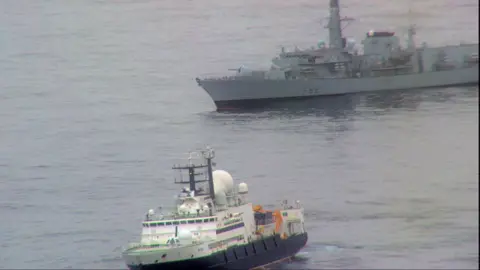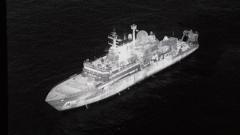Russian spy ship pointed lasers at RAF pilots tracking it, says UK
6 minutes agoBrian Wheeler,Political reporter and Paul Seddon,Political reporter
A Russian spy ship has used lasers for the first time to disrupt RAF pilots tracking its activity near UK waters, the defence secretary has said.
John Healey told reporters the “deeply dangerous” move from the Yantar was being taken “extremely seriously” by the government.
He added that the vessel was north of Scotland and had entered UK waters for the second time this year during the last few weeks.
The UK would continue monitoring the ship and had “military options ready should the Yantar change course,” he added.
“My message to Russia and to Putin is this: we see you. We know what you’re doing. And if the Yantar travels south this week, we are ready,” he added.
Healey said the laser incident took place whilst the Yantar was being followed by a Royal Navy frigate and RAF Poseidon P-8 planes deployed to “track the vessel’s every move”. It is understood the episode occurred within the last two weeks.
Speaking at a news conference in Downing Street, the defence secretary added he had changed the Royal Navy’s rules of engagement so that it could follow the Yantar more closely “when it is in our wider waters”.
Healey said the vessel, which entered service in 2015, was part of Russia’s Main Directorate for Deep Sea Research (GUGI), which was designed to “undertake surveillance in peacetime and sabotage in conflict”.
“We have military options ready should the Yantar change course. I am not going to reveal those because that only makes President Putin wiser,” he said.
Asked about the risks posed by lasers, Healey replied: “Anything that impedes, disrupts or puts at risk pilots in charge of British military planes is deeply dangerous.”
January warning
The defence secretary previously issued a warning about the Yantar after it was spotted in UK waters in January, calling it “another example of growing Russian aggression”.
According to the ship tracking website Marine Traffic, the ship has not broadcast its location since 2 November, and was last tracked in the Baltic Sea north of the Latvian Coast.
On 6 November, the Dutch Navy said two of its vessels escorted the Yantar out of the North Sea, where it was operating near Dutch territorial waters.
While the Yantar’s current position is not clear, flight tracking website FlightRadar24 shows an RAF Poseidon P-8 surveillance plane circling off the Scottish coast, although it is not certain that this is tracking the Yantar.

 Ministry of Defence
Ministry of DefenceRussia describes Yantar, which is operated by the country’s Ministry of Defence, as an oceanic research vessel. Western nations have often tracked it in European waters and they suspect part of its mission has been to map undersea cables.
Russia is yet to respond to Healey’s latest comments. After his warning in January, the country’s embassy dismissed his “baseless” remarks as “anti-Russian alarmism”, the state-owned TASS news agency reported.
Elisabeth Braw, a senior fellow at the Atlantic Council, an American security think tank, said the Yantar’s use of lasers was “an escalation for sure”.
“Essentially, you do it to impede the pilots from doing their work,” she told BBC Radio 4’s World At One.
“We don’t know exactly how strong the lasers were, but even if they didn’t blind the pilots, it was provocative,” she added.
The UK and its Nato allies are concerned about the risk Russia poses to offshore cables, pipelines and other infrastructure critical to internet connectivity.
In his speech, the defence secretary warned about Russian incursions into Nato airspace, as well as the threats posed by China and armed conflicts around the world, adding: “Our world is changing. It is less predictable. It is more dangerous.”
Meanwhile, the Ministry of Defence has come under criticism from a committee of MPs for being over-reliant on US defence resources and not being prepared to defend the UK and its overseas territories from military attack.
The committee said the UK and its European allies should be building up their capabilities to prepare for potential US withdrawal.
Healey said the UK government “takes a different view” to the committee about America’s commitment to Nato.
But he said the committee was “right to say” Britain should “pick up the pace of our commitment” and that was something Labour has been doing since it came to power last year.
Defence talks ongoing
The report comes as British negotiators race to agree a deal with the EU to enable British defence companies to contribute to projects funded by a new €150bn (£130bn) EU defence loan scheme set to launch next year.
The Labour government wants to conclude a deal in the coming weeks to allow British companies to take part in the first round of bids from EU countries, with applications due by the end of this month.
Healey told reporters the UK wanted to be part of the programme, but not “at any price”, amid reports the two sides are at odds over the entry fee the UK could pay to enable British firms to take part.
It has been reported that the EU is demanding an entry fee running to billions of euros before the UK can take part.
He added that any financial contribution to take part would have to be “good value for money for our taxpayers and our industry”.
